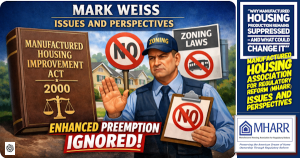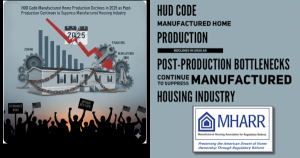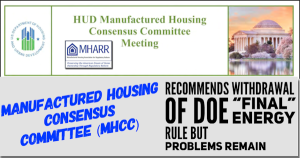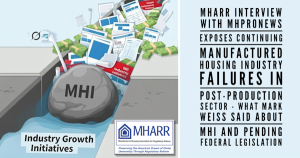White House Initiates Engagement With MHARR
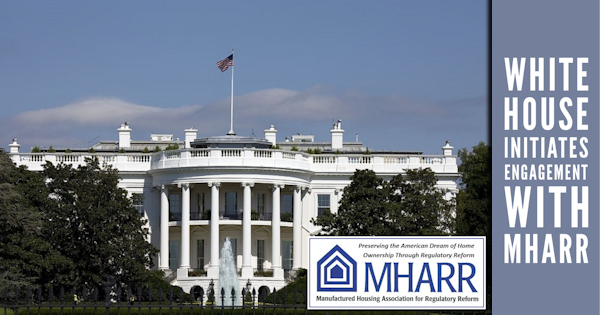
FEBRUARY 16, 2022
On the heels of its February 10, 2022 meeting with senior Ginnie Mae executives regarding manufactured home consumer financing and the destructive “10-10” rule, MHARR representatives met on February 14, 2022 with the Director for Housing Efficiency of the White House Council on Environmental Quality (CEQ) and related HUD officials connected with a White House Task Force that will be addressing the utilization and availability of affordable manufactured housing.
As part of this meeting, MHARR stressed the two key post-production issues that have been particularly at fault in suppressing the utilization of mainstream HUD Code manufactured homes – (1) the lack of federal consumer lending support for manufactured home purchasers (and particularly discrimination against manufactured home personal property loans which comprise nearly 80% of the manufactured housing market) under the Duty to Serve (DTS) mandate and the Ginnie Mae “10-10” rule; and (2) discriminatory zoning and placement measures that have either excluded or severely restricted the placement of inherently affordable manufactured homes in many areas of the United States. These two crucial issues, not coincidentally, will be addressed in detail in MHARR’s upcoming White Paper on the exploitation of manufactured housing in federal housing and financial assistance programs for purely public relations purposes. In addition, MHARR also raised the pending U.S. Department of Energy manufactured housing energy standards rule which threatens cost increases that could well exclude millions of American families from the HUD Code market.
With the White House Task Force exploring the concept of a public meeting or similar forum to address issues surrounding the more robust utilization and availability of HUD Code manufactured housing, MHARR looks forward to participating further in this initiative and to forcefully advocating for reforms that are necessary to allow manufactured housing to reach its full potential as a key source for housing equity and affordable homeownership.
These matters will be discussed in greater detail at MHARR’s upcoming Board of Directors meeting.
Meanwhile, MHARR will continue to keep you apprised of further developments concerning its participation in the activities of the White House task Force.
cc: Other Interested HUD Code Manufactured Housing Producers, Retailers, Communities and Finance Companies
Manufactured Housing Association for Regulatory Reform (MHARR)
1331 Pennsylvania Ave N.W., Suite 512
Washington D.C. 20004
Phone: 202/783-4087
Fax: 202/783-4075
Email: MHARR@MHARRPUBLICATIONS.COM
Website: manufacturedhousingassociation.org
FEBRUARY 16, 2022
On the heels of its February 10, 2022 meeting with senior Ginnie Mae executives regarding manufactured home consumer financing and the destructive “10-10” rule, MHARR representatives met on February 14, 2022 with the Director for Housing Efficiency of the White House Council on Environmental Quality (CEQ) and related HUD officials connected with a White House Task Force that will be addressing the utilization and availability of affordable manufactured housing.
As part of this meeting, MHARR stressed the two key post-production issues that have been particularly at fault in suppressing the utilization of mainstream HUD Code manufactured homes – (1) the lack of federal consumer lending support for manufactured home purchasers (and particularly discrimination against manufactured home personal property loans which comprise nearly 80% of the manufactured housing market) under the Duty to Serve (DTS) mandate and the Ginnie Mae “10-10” rule; and (2) discriminatory zoning and placement measures that have either excluded or severely restricted the placement of inherently affordable manufactured homes in many areas of the United States. These two crucial issues, not coincidentally, will be addressed in detail in MHARR’s upcoming White Paper on the exploitation of manufactured housing in federal housing and financial assistance programs for purely public relations purposes. In addition, MHARR also raised the pending U.S. Department of Energy manufactured housing energy standards rule which threatens cost increases that could well exclude millions of American families from the HUD Code market.
With the White House Task Force exploring the concept of a public meeting or similar forum to address issues surrounding the more robust utilization and availability of HUD Code manufactured housing, MHARR looks forward to participating further in this initiative and to forcefully advocating for reforms that are necessary to allow manufactured housing to reach its full potential as a key source for housing equity and affordable homeownership.
These matters will be discussed in greater detail at MHARR’s upcoming Board of Directors meeting.
Meanwhile, MHARR will continue to keep you apprised of further developments concerning its participation in the activities of the White House task Force.
cc: Other Interested HUD Code Manufactured Housing Producers, Retailers, Communities and Finance Companies
Manufactured Housing Association for Regulatory Reform (MHARR)
1331 Pennsylvania Ave N.W., Suite 512
Washington D.C. 20004
Phone: 202/783-4087
Fax: 202/783-4075
Email: MHARR@MHARRPUBLICATIONS.COM
Website: manufacturedhousingassociation.org

